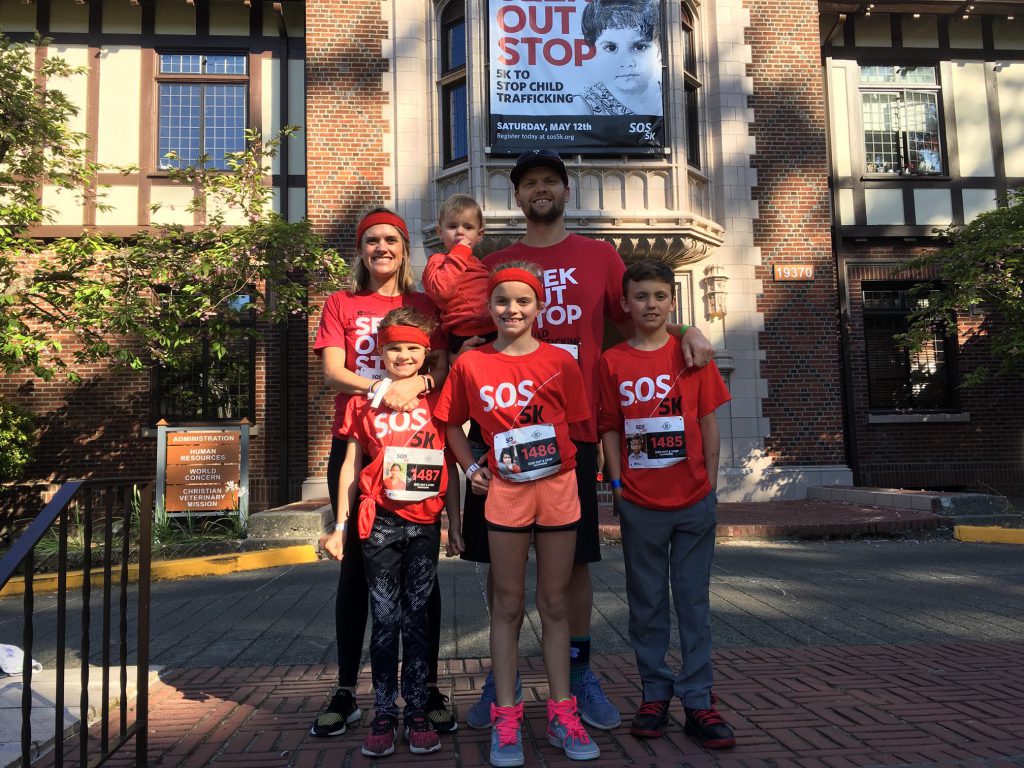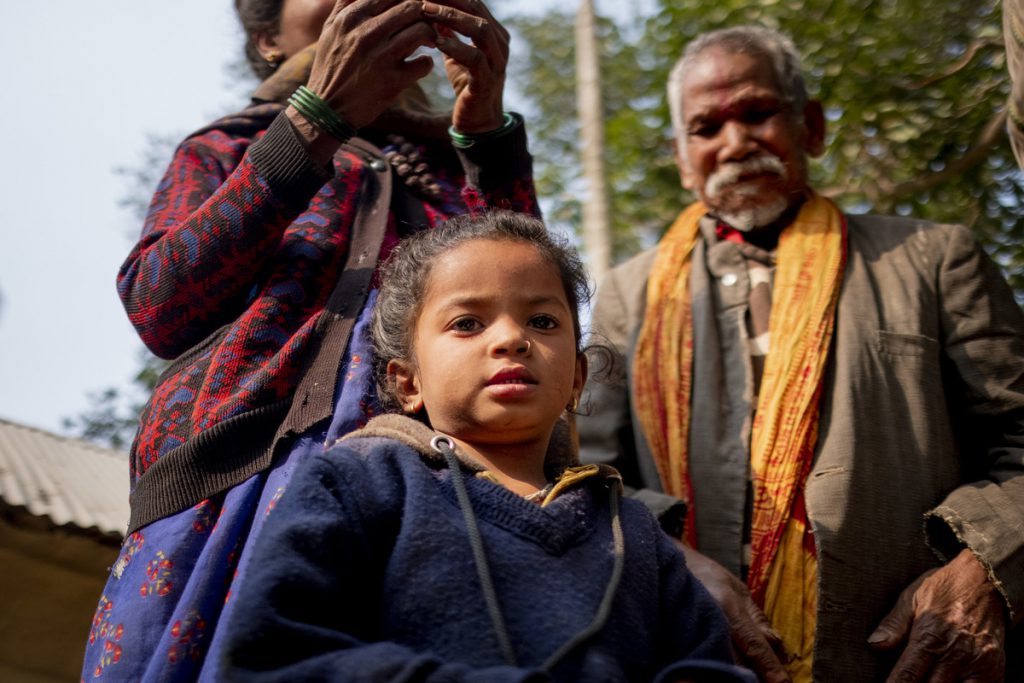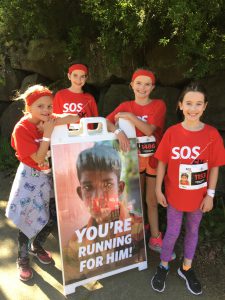Stories
How to Talk to Your Kids about Human Trafficking

As a parent, it’s natural to want to protect your kids from things that could harm or upset them.
But at the same time, you want to answer their tough questions honestly and help them grow into compassionate young people.
Not knowing when to bring up difficult subjects like human trafficking, where to start, and how much detail to go into are a few reasons we choose not to talk to our kids about them at all.
How are you supposed to be honest while still protecting your kids?
Tips to Talk about Human Trafficking with Your Kids
Emilie is a mom of four (ages ranging from three to eleven) whose family participates each year in the S.O.S. 5k to Seek Out and Stop child trafficking.
Since the event itself is focused on stopping child trafficking, the subject of trafficking is unavoidable. As a result, she’s had quite the experience engaging her own kids in these tough conversations.

Emilie and her family participating in last year's S.O.S. 5k.
Emilie understands that most parents, like herself, want to help their kids work through these tough subjects but often don’t know how.
So, with her help, we’ve put together a list of tips for parents about how to talk with your kids about trafficking.
Engage Your Kids in a Natural Conversation
One of the first and most important tips is to talk to your kids about human trafficking or other tough subjects as they come up in conversation. Whether it’s something they heard on the news or at an event like the S.O.S. 5k, let your kids be the ones to initiate.
“I always think of the birds and the bees talk. Like how awkward is that? It’s not sitting down with the kids and saying ‘I’m going to talk to you about trafficking.’ It’s a natural conversation that we have,” Emilie explained.
You might find that some of your kids will ask more questions than others. Some make assumptions and some don’t, while others aren’t aware of the subject at all. That’s ok. Every kid is different and will ask about issues like trafficking when they’re ready.
Keep Your Answers Age-Appropriate
When you do find yourself faced with questions such as “what’s sex trafficking?” or “I heard about trafficking today—do you know what that is?” it’s important to keep your answers age-appropriate.
Emilie has an eight-year-old who asks a lot of questions, but isn’t of the age where the concept of sex or even labor trafficking is an appropriate conversation. For younger kids, Emilie suggests talking to them about kids being forced to do things that are not safe or kids not having safe adults who can protect them. On the other hand, older kids might be more ready to talk about the different types of trafficking.
If you do have a child who asks question after question, answer them honestly and in a way that meets them where they are.
Talk about the Importance of Protection
“We talk about protection a lot,” Emilie said, relating trafficking to the ability to protect ourselves. “It’s an introduction, for when you’re little, about protecting our bodies. It’s kind of a natural progression from that.”
A great resource (and one Emilie uses herself) is the book God Made All of Me. It’s a kid-friendly introduction to protecting our bodies and can help you, as a parent, navigate these tricky topics and conversations. You can talk about how your kids can protect their bodies and have people who can teach them how, but not every kid is able to do that.
Connect Trafficking to the Bigger Picture
When your kids do bring up the topic of trafficking, you can use the opportunity to talk about why things like trafficking happen in the first place.

This little girl is safe with her parents, but many children in poverty don't have that protection.
For example, poverty plays a big role in the frequency of human trafficking.
Talk to your kids about what they have—a home, food to eat, and safe people who can teach and protect them. Then, talk about other kids who don’t have homes, food, or protection.
In the United States, we have organizations and people who can provide resources like food, but in some countries there’s nothing like that. Sometimes, parents and kids who don’t have these things feel like they have to make dangerous choices just to feed their families.
Bring it Back to the Gospel
Learning about the dangers of trafficking is difficult, but it can be especially hard for a child who might be hearing about unsafe adults or children being taken for the first time.
As Christians, we have a hope that is greater than all the horrible things in this world. Jesus, our true source of hope, is who we lean on to answer these questions. Why do people traffic children? Why do people do bad things? Your kids might have a hard time understanding why people would do evil things like traffic vulnerable children.
Without hope, trying to reason through these questions would be nearly impossible. But it’s Jesus himself who makes it possible for us to discuss things like trafficking with our kids.
Using age-appropriate language, you can talk about how Jesus came to redeem every one of us—from a child who’s been taken to the person who trafficked her. We’re all broken, sinful people who need Jesus. It’s only by his love and grace that we can overcome the sin in our lives. That’s why the gospel is our true source of hope, available for anyone who believes.
A Resource for Parents to Talk about Human Trafficking

Emilie's daughters and friends at the S.O.S. 5k.
When your kids ask about trafficking, where do you start? Sometimes that’s the biggest hurdle to overcome. World Concern’s S.O.S. 5k to Seek Out and Stop child trafficking is a great way to introduce your family to a tough subject like trafficking—and then do something about it!
It’s a fun, family-friendly event that is an approachable introduction to what you and your family can do to protect vulnerable children. At the S.O.S. 5k you’ll find information about trafficking, but also ways you and your family can help prevent it.
You can come to the 5k to walk, run, or volunteer. But most importantly, every $48 raised helps protect one child from the threat of trafficking.
“I can’t think of anyone who is more vulnerable than a child without anyone to protect them, who is being exploited like that.”
Emilie brings her family every year and notes that her kids engage in different ways. Her son comes to run with his friends, one of her daughters likes to invite her friends, and another loves to fundraise (according to Emilie, she’s a fearless fundraiser!).
No matter how they choose to participate, Emilie explained, each of her kids is being exposed to the reality of the world we live in and given an opportunity to help make it right.
Knowing how and when to talk to your kids about human trafficking isn’t easy, but we hope these tips will come in handy as you encounter these tough conversations.
To learn more about engaging your family in events like the S.O.S. 5k, visit www.sos5k.org.